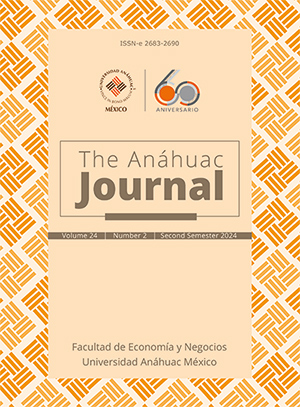Perceptual Variables and Nascent Entrepreneurship in Selected Latin American Countries. Evidence from GEM 2018 Survey.
Main Article Content
Abstract
Abstract
Purpose: Provide empirical evidence of the impact of perceptual variables and beliefs on a person's decision to join or not to join the group of nascent entrepreneurs.
Methodology: Logistic regression applied to the most recent data from nine Latin American countries available in the 2018 GEM survey. Following existing literature, we interconnect perceptual variables with control variables in the form of sociodemographic characteristics.
Results: New entrepreneurs tend to depend more on subjective perceptions than on sociodemographic variables. Evidence suggests that having the confidence of possessing the necessary knowledge and skills plus knowing a model entrepreneur are inseparable variables with the greatest impact on the decision to become an entrepreneur. Our results also suggest that entrepreneurial knowledge does not necessarily originate from formal classroom education, as this variable was found to be not significant in the model. This supports the hypothesis that confidence in one's knowledge and abilities result from the contact with other entrepreneurs who serve as role models, instructors and mentors, which is consistent with Social Learning Theory.
Downloads
PLUMX Metrics
Article Details

This work is licensed under a Creative Commons Attribution-NonCommercial-ShareAlike 4.0 International License.
This work is licensed under a Creative Commons Atribución-NoComercial-CompartirIgual 4.0 Internacional.
References
References
Acs, Z.J., Audretsch, D., Braunerhjelm, P., & Carlsson, B. (2012). B. “Growth and Entrepreneurship: An Empirical Assessment.” Small Business Economics. 39: 289-300. https://link.springer.com/content/pdf/10.1007/s11187-010-9307-2.pdf?pdf=button
Arenius, P. & Minniti, M. (2005). “Perceptual Variables and Nascent Entrepreneurship”. Small Business Economics. Vol 24, issue 3, 233-247. https://www.researchgate.net/publication/5158278_Perceptual_Variables_and_Nascent_Entrepreneurship
Abbasianchavari, A. & Moritz, A. (2020). “The impact of role models on entrepreneurial intentions and behavior: a review of the literature". Management Review Quarterly 71: 1-40. https://www.researchgate.net/publication/338923485_The_impact_of_role_models_on_entrepreneurial_intentions_and_behavior_a_review_of_the_literature
Bosma, N., Hessels, J., Schutjens, V., van Pragg, M., & Verheul, I. (2012). “Entrepreneurship and Role Models”. Journal of Economic Psychology, Vol. 33, No. 2. SSRN: https://ssrn.com/abstract=1803091
Casson, M. C. (1982). The Entrepreneur: An Economic Theory. University of Illinois at Urbana-Champaign's Academy for Entrepreneurial Leadership Historical Research Reference in Entrepreneurship. SSRN: https://ssrn.com/abstract=1496173
Escobar Cabrera, J.P. (2017). “Determinantes del emprendimiento en Colombia: una visión Schumpeteriana y Kirzneriana”. Trabajo de grado para optar por el título de Economista. Universidad del Norte. Instituto de Estudios Económicos del Caribe. https://manglar.uninorte.edu.co/bitstream/handle/10584/10871/1140851003.pdf?sequence=1&isAllowed=y
Fishbein, M. & Ajzen, I. (1975). Belief, attitude, intention, and behavior: an introduction to theory and research. Addison-Wesley Pub. Co. https://people.umass.edu/aizen/pubs/book/ch8.pdf
GEM, (2018, 2022). Global Individual Data and Reports. GEM Global Entrepreneurship Monitor (gemconsortium.org)
Nowinski, W. & Yacine Haddoud. M. (2019). “The role of inspiring role models in enhancing entrepreneurial intention”. Journal of Business Research 96, (2019), 183-193. https://reader.elsevier.com/reader/sd/pii/S0148296318305575?token=2886837816C14657221C85576962ADAE18DD81B72B28D45F4FA17AFD83735469F176112FCEB445FE68246169F6D5F341&originRegion=us-east-1&originCreation=20221109160459
Ozdemir, O., & Kradeniz, E. (2011). “Investigating the factors affecting total entrepreneurial activities in Turkey (211)”. ODTÜ Gelişme Dergisi, 38(3), 275–290. https://open.metu.edu.tr/handle/11511/58382
Schmutzler, J., Andonova, V. & Diaz-Serrano, L. (2015). “When Culture Does (not) Matter: Role Models and Self Efficacy as Drivers of Entrepreneurial Behavior”. Working Papers; 2072/247806. Universitat Rovirari Virgili, Department of Economics. Retrieved from: https://recercat.cat/bitstream/handle/2072/247806/201511.pdf?sequence=1
Vodă, A.I.; Butnaru, G.I. & Butnaru, R.C. (2020). “Enablers of Entrepreneurial Activity across the European Union—An Analysis Using GEM Individual Data”. Retrieved from https://doi.org/10.3390/su12031022

